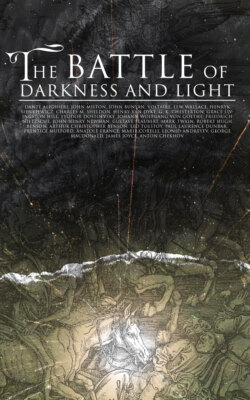Читать книгу The Battle of Darkness and Light - Джон Мильтон - Страница 153
На сайте Литреса книга снята с продажи.
XIII.(1)
The Dance.
ОглавлениеTable of Contents
Arriving in due time at the island of Serendib, Zadig's merits were at once recognized, and he was popularly regarded as an extraordinary man. He became the friend of the wise and learned, the arbitrator of disputes, and the advisor of the small number of those who were willing to take advice. He was duly presented to the king, who was pleased with his affability, and soon chose him for his friend. But this royal favor caused Zadig to tremble; for he well remembered the misfortunes which the kindness of king Moabdar had formerly brought upon him. "I please the king," said he; "shall I not therefore be lost?" Still he could not refuse the king's friendship, for it must be confessed that Nabussan, king of Serendib, son of Nassanab, son of Nabassun, son of Sanbusna, was one of the most amiable princes in Asia.
But this good prince was always flattered, deceived, and robbed. It was a contest who should most pillage the royal treasury. The example set by the receiver-general of Serendib was universally followed by the inferior officers.
This the king knew. He had often changed his treasurers, but had never been able to change the established custom of dividing the revenues into two unequal parts, of which the smaller came to his majesty, and the larger to his officers.
This custom Nabussan explained to Zadig. "You, whose knowledge embraces so many subjects," said he, "can you not tell me how to select a treasurer who will not rob me?" "Assuredly," said Zadig; "I know a sure method for finding you a man who will keep his hands clean."
The king was charmed, and asked, while he embraced him, how this was to be done.
"You have only," said Zadig, "to cause all those who apply for the office of treasurer to dance. He who dances the lightest will surely prove to be the most honest man."
"You jest," said the king. "A strange way, certainly, of choosing a receiver of my revenues. What! do you pretend that he who cuts the neatest caper will be the most just and skillful financier?"
"I will not answer," returned Zadig, "for his being the most skillful, but I assure you he will be the most honest."
Zadig spoke with so much confidence that the king imagined he had some supernatural test for selecting honest financiers.
"I do not like the supernatural," said Zadig: "people and books dealing in prodigies have always displeased me. If your majesty will permit me to make the test, you will be convinced it is the easiest and simplest thing possible."
Nabussan consented, and was more astonished to hear that the test was simple, than if it had been claimed as a miracle.
"Leave all the details to me," said Zadig: "You will gain more by this trial than you imagine."
The same day he made proclamation in the king's name, that all candidates for the office of receiver-in-chief of the revenues of his gracious majesty Nabussan, son of Nussanab, must present themselves in dresses of light silk, on the first day of the month of the crocodile, in the king's anti-chamber. The candidates came, accordingly, to the number of sixty-four. Musicians were placed in an adjoining room, and all was prepared for the dance. As the door of the saloon was closed, it was necessary, in order to enter it, to pass through a small gallery which was slightly darkened. An usher directed each candidate in succession through this obscure passage, in which he was left alone for some moments. The king, being aware of the plan, had temptingly spread out in this gallery many of his choicest treasures. When all the candidates were assembled in the saloon, the king ordered the band to play and the dance to begin. Never had dancers performed more unwillingly or with less grace. Their heads were down, their backs bent, their hands pressed to their sides.
"What rascals!" murmured Zadig.
One alone danced with grace and agility,—his head up, his look assured, his body erect, his arms free, his motions natural.
"Ah, the honest man, the excellent man!" cried Zadig.
The king embraced this upright dancer, appointed him treasurer, and punished all the others with the utmost justice, for each one had, while passing through the gallery, filled his pockets till he could hardly walk. His majesty was distressed at this exhibition of dishonesty, and regretted that among these sixty-four dancers there should be sixty-three thieves. This dark gallery was then named the Corridor of Temptation.
In Persia these sixty-three lords would have been impaled; in other countries a chamber of justice would have consumed in costs three times the money stolen, replacing nothing in the king's coffers; in yet another kingdom they would have been honorably acquitted, and the light dancer disgraced; in Serendib they were only sentenced to add to the public treasure, for Nabussan was very indulgent.
He was also very grateful, and willingly gave Zadig a larger sum than any treasurer had ever stolen from the revenue. This wealth Zadig used to send a courier to Babylon to learn the fate of queen Astarte. His voice trembled when directing the courier. His blood seemed to stagnate in his veins. His heart almost ceased to beat. His eyes were suffused with tears.
